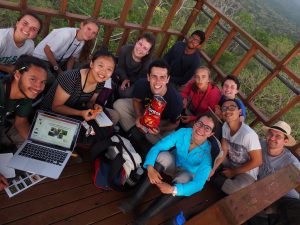
Wow! This was an amazing experience! I am so grateful I was fortunate enough to take this class and am so happy I chose to! To anyone considering taking it, do it! I learned more in this class than in a semester-long one because this is experiential learning, which at least for me, helps me learn and enjoy it so much more.
I learned a lot about rainforest and coral reef ecosystems. They are both so diverse and can host such a large range of creatures. Before, I may have only thought about rainforests as trees or coral reefs as hard corals. Now, I think of them as the entire flora and fauna body that thrives from its structures. A lot of their similarities in hosting many trophic webs stems from the fact that they are so diverse. I think it was easier to notice how diverse the coral reefs were because you could see better all the different creatures. The rainforest is more dense and larger animals can hide easier, so it was harder to notice this. Also, both ecosystems are threatened by global warming, pollution, human interactions, or other interferences. This was more noticeable in the coral reefs as well because you could see all the dead corals and compare to the non-protected site, while you could not see that as easily in the rainforest.
This course was so much better than my expectation. I was nervous that I may not fully understand everything since I have not taken any other EBIO courses, but it easily laid out how to conduct field research and taught me so much about the ecosystems in play. My favorite part of the course was the comparison of the marine protected area site and the not marine protected area site because it was interesting to see the differences. I also loved looking for crustaceans and identifying them because they are easier to see up close than birds. OH AND SHARKS. My least favorite part was just how exhausted I was at the end of the day and probably all the bugs, but that is to be expected and is outweighed by all the positives.
The three most important things I learned in this course are how to design my own question and analyze my data, different methods of research (quadrant/transact, camera traps, pitfall traps), and how to make meaningful observations. I’ve taken labs before (biochemistry labs) but this class really helped me design a significant question and learn how to follow through on it all the way to a poster. I also had no idea how to do any EBIO methods until this class and it was an interesting contrast to all my normal lab work. Finally, using my field notebook and taxon cards helped me learn to keep my eyes open and observe what is around me because even small details matter.
The most surprising part of this class for me was how close I became with everyone else on the trip and how much fun we could all have while still learning! TAKE THIS CLASS!!!!
Acknowledgments: Dory, SFS, Turez
















